The White House said the closure of border crossings into Gaza was "unacceptable," after Israel sent tanks into the southern city of Rafah and seized control of the crossing with Egypt.
"The crossings that have been closed need to be reopened, it is unacceptable for them to be closed," press secretary Karine Jean-Pierre told a briefing, adding that another crossing, at Kerem Shalom, was expected to reopen tomorrow.
The UN and other international aid agencies said the closing of the two crossings into southern Gaza had virtually cut the enclave off from outside aid and very few stores were available inside.
Meanwhile, UN Secretary-General Antonio Guterres has called for the crossings into Gaza to be reopened immediately and urged Israel to "stop any escalation" after it sent tanks into Rafah.
"I am disturbed and distressed by the renewed military activity in Rafah by the Israeli Defense Forces," he said. "The closure of both the Rafah and Kerem Shalom crossings is especially damaging to an already dire humanitarian situation. They must be re-opened immediately.
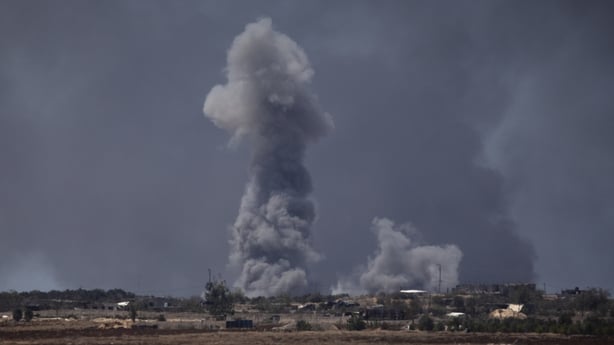
"I urge the Government of Israel to stop any escalation, and engage constructively in the ongoing diplomatic talks."
Israel overnight sent tanks into Rafah in southern Gaza, seizing control of the border crossing with Egypt, an operation the United Nations said denied it access to the key humanitarian passage.
The military's thrust into the eastern sector of the city packed with displaced civilians came a day after Israel warned Palestinians in the area to evacuate ahead of a long-threatened ground operation.
Army footage showed tanks flying the Israeli flag taking "operational control" of the Palestinian side of the border crossing, it said, in a deployment that had a "very limited scope against very specific targets".
UN humanitarian office spokesman Jens Laerke said Israel had denied it access to both Rafah and Kerem Shalom with only "one day of fuel available" inside the besieged territory.
Unless fuel was allowed in, "it would be a very effective way of putting the humanitarian operation in its grave", he warned.
Overnight, heavy bombardments rocked Rafah, an AFP correspondent reported. The Kuwaiti hospital said 23 people were killed and the Najjar hospital said another four people were killed.
Later, Hamas's armed wing said it fired rockets at Israeli troops at Kerem Shalom, two days after four Israeli soldiers were killed in an attack it also claimed.
The Israeli army alleged the latest attack was launched from Rafah.
Earlier, the Israeli military said that it has taken operational control of the Palestinian side of Gaza's
Hamas said last night that it had informed Egypt and Qatar of its "approval of their proposal regarding a ceasefire" in the conflict, prompting cheering crowds to take to the streets of Rafah.
The office of Israeli Prime Minister Benjamin Netanyahu said the proposal was "far from Israel's essential demands", but the government would send negotiators for talks "to exhaust the potential for arriving at an agreement".
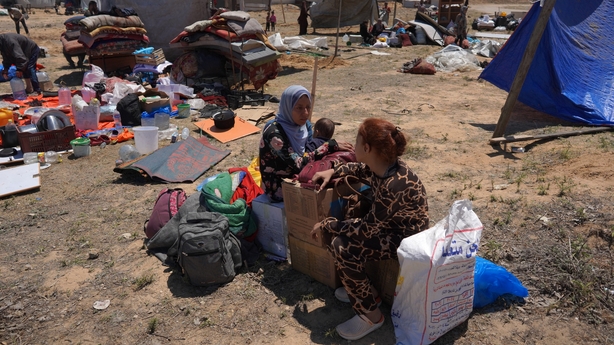
In the meantime, it added, "Israel is continuing the operation in Rafah to exert military pressure on Hamas in order to advance the release of our hostages and the other objectives of the war".
Close Israeli ally the United States said it was "reviewing" the Hamas response.
Hamas member Khalil al-Hayya told the Qatar-based Al Jazeera news channel that the proposal agreed to by Hamas involved a three-phase truce.
It included a complete Israeli withdrawal from Gaza, the return of Palestinians displaced by the war and a hostage-prisoner exchange, with the goal of a "permanent ceasefire", he said.
Qatar said it was sending a delegation to Cairo this morning to resume negotiations in the "hope that the talks will culminate in reaching an agreement for an immediate and permanent ceasefire in the Gaza Strip".
A senior Hamas official, speaking to AFP on condition of anonymity, said Israel must now decide whether it accepts or "obstructs" a truce.
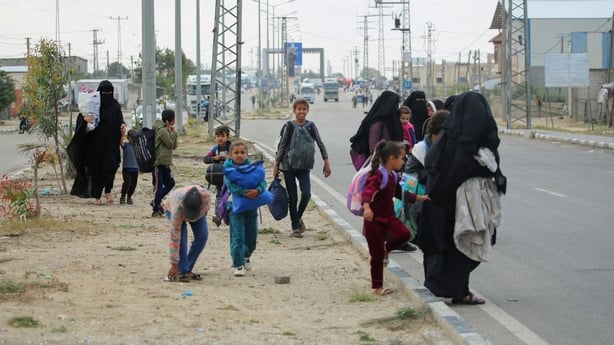
Jordan's Foreign Minister Ayman Safadi said on X that Mr Netanyahu was jeopardising a ceasefire by bombing Rafah.
An Israeli official, speaking on condition of anonymity, told Reuters said the proposal that Hamas approved was a watered-down version of an Egyptian offer and included elements that Israel could not accept.
"This would appear to be a ruse intended to make Israel look like the side refusing a deal," said the Israeli official.
Another official briefed on the agreement said Hamas had agreed to the phased ceasefire and hostage release deal Israel proposed on 27 April with only minor changes that did not affect the main parts of the proposal.
US State Department spokesman Matthew Miller said Washington would discuss the Hamas response with its allies in the coming hours, and a deal was "absolutely achievable".
More than 34,789 people have been killed in the conflict, according to Gaza health officials. The UN has said famine is imminent in the territory.
The war began when Hamas militants attacked Israel on 7 October, killing about 1,200 people and abducting 252 others, of whom 133 are believed to remain in captivity in Gaza, according to Israeli tallies.
Rafah hit by strikes
International alarm has been steadily building about the consequences of an Israeli ground invasion of Rafah, where the United Nations says 1.4 million people are sheltering.
EU foreign policy chief Josep Borrell expressed concern that an attack was started on Rafah despite warnings from the European Union and the United States.
"I am afraid that this is going to cause again a lot of casualties, civilian casualties," he said.
Egypt's foreign ministry warned of "grave humanitarian risks" for those sheltering in Rafah and urged Israel to "exercise the utmost restraint".
In a conversation with Mr Netanyahu yesterday, US President Joe Biden restated "his clear position" opposing an invasion of the city, the White House said.
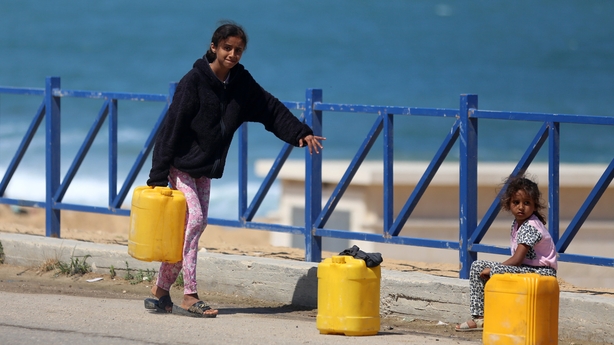
Mr Netanyahu has vowed to eventually send ground troops into Rafah regardless of any truce, saying it needs to root out Hamas's remaining forces to prevent a repeat of the 7 October attacks.
Militants who carried out the October 7 attack also abducted 250 hostages, of whom Israel estimates 128 remain in Gaza, including 35 the military says are dead.
The Hostages and Missing Families Forum said in a statement after Hamas's announcement yesterday that "now is the time for all that are involved to fulfil their commitment and turn this opportunity into a deal for the return of all the hostages".
Hamas said Israel was planning a large-scale offensive "without regard for the ongoing humanitarian catastrophe" in Gaza or for the fate of the hostages held in the Hamas-run territory.
"The Israeli occupation deliberately exacerbates the humanitarian situation by closing the Rafah and Kerem (Shalom) crossings," the Hamas government's media office said.
Israel said its "limited" and temporary Rafah evacuation order aimed "to get people out of harm's way".
The Palestinian Red Crescent reported "thousands" of Gazans leaving the city's east.
Israel's military told those in eastern Rafah to head for the "expanded humanitarian area" at Al-Mawasi on the coast.
But aid groups said Al-Mawasi was not ready for such an influx.
Asked how many people should move, an Israeli military spokesman said: "The estimate is around 100,000 people."
The Red Crescent said the designated evacuation zone hosts around 250,000 people, many of them already uprooted from elsewhere.
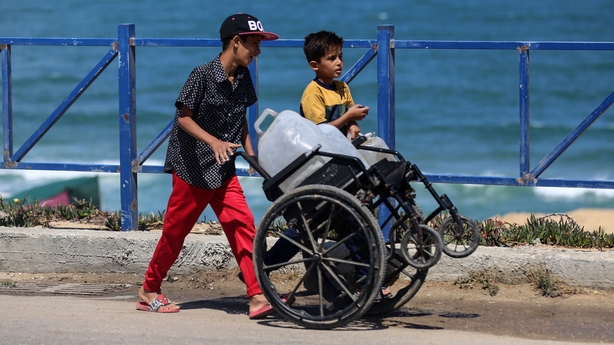
US completes construction of Gaza aid pier - Pentagon
The US military has completed construction of the Gaza aid pier, but weather conditions mean it is currently unsafe to move the two-part facility into place, the Pentagon said.
The pier - which the US military started constructing last month and which will cost at least $320 million (€298m) - is aimed at boosting deliveries of desperately needed humanitarian assistance to Gaza, which has been ravaged by more than six months of Israeli attacks.
"As of today, the construction of the two portions of the JLOTS - the floating pier and the Trident pier - are complete and awaiting final movement offshore," deputy Pentagon press secretary Sabrina Singh told journalists, using an acronym for 'Joint Logistics Over-the-Shore' - the official name for the pier capability.
"Today there are still forecasted high winds and high sea swells, which are causing unsafe conditions for the JLOTS components to be moved. So the pier sections and military vessels involved in its construction are still positioned at the port of Ashdod," Ms Singh said.
US Central Command "stands by to move the pier into position in the near future," she added.
The vessels and the under-construction pier were moved to the Israeli port due to bad weather last week. Once the weather clears, it will be anchored to the Gaza shore by Israeli soldiers to keep US troops off the ground.
Aid will then be transported via commercial vessels to a floating platform off the Gaza coast, where it will be transferred to smaller vessels, brought to the pier and that is anchored to shore, and taken to land by truck for distribution.
